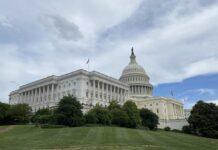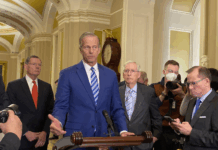
WASHINGTON (GA Recorder) — The United States and Western allies stepped up economic sanctions on Russia following its escalated attack on Ukraine, President Joe Biden said at the White House on Thursday.
Biden had for weeks pledged to impose significant sanctions on Russia if President Vladimir Putin followed through on plans to invade Ukraine. As the invasion ramped up early Thursday morning and Russian forces shelled Ukraine, Biden also increased sanctions.
“Putin is the aggressor,” Biden said. “Putin chose this war. And now he and his country will bear the consequences.”
The sanctions mostly target Russia’s financial sector. The U.S. and allies will limit Russia’s ability to use international currency, including U.S. dollars, euros, pounds and yen. The U.S. Treasury Department will freeze roughly $1 trillion in assets held by Russian banks.
Biden also froze U.S. exports to Russia of products used for high-tech industries, part of an effort to degrade the Russian aerospace industry and military, he said.
Meanwhile, Defense Secretary Lloyd Austin, at the direction of the president, authorized the deployment of 7,000 additional U.S. troops to Germany, according to a senior Defense official.
A Pentagon spokesperson said the 1st Armored Brigade Combat Team, 3rd Infantry Division, from Fort Stewart in Southeast Georgia, will be deployed.
The soldiers, who will leave in the next few days, are intended “to reassure NATO allies, deter Russian aggression and be prepared to support a range of requirements in the region,” according to the official.
Biden has said repeatedly that U.S. troops will not be deployed to Ukraine.
Global financial system
Russia will not be expelled from the global financial system known as SWIFT — a move some thought possible — because European allies did not support that plan, Biden said.
Other sanctions on Russia financial institutions were stronger than a removal from SWIFT, Biden said.
Assets from the four largest Russian banks that touch the U.S. financial system would be frozen, he said. Individual members of Russia’s elite class would also be sanctioned, with their U.S. assets frozen, Biden said.
Treasury also announced sanctions on the Belarusian defense sector and financial institutions. Belarus is a close ally of Russia and part of the invasion of Ukraine came across the Belarusian border.
Biden estimated sanctions from the U.S. and allies would halt roughly half of Russia’s high-tech imports.
“It will strike a blow to their ability to continue to modernize their military,” he said. “It’ll degrade their aerospace industry, including their space program. It will hurt their ability to build ships, reducing their ability to compete economically. And it will be a major hit to Putin’s long-term strategic ambitions.”
Biden insisted that sanctions could be effective in curbing Russian aggression, despite the threat of earlier sanctions seemingly doing little to deter Putin.
“This is going to take time,” he said. Putin is “now going to see the effect of the sanctions … It will so weaken his country that he’ll have to make a very, very difficult choice.”
Republicans react
Senate Minority Leader Mitch McConnell said in a statement that Congress should impose “truly devastating sanctions against the Kremlin and its enablers.”
The Kentucky Republican then called on the United States and the 29 other nations within the North Atlantic Treaty Organization to “redouble our material support for Ukraine’s resistance” and “invest in the capabilities needed for long-term military competition with Russia and China.”
McConnell said the government funding package Congress is on track to pass before March 11 “will provide an opportunity to lead by example.”
Thursday’s sanctions package was tailored to allow energy payments to continue, Biden said, adding that they were targeted “to maximize a long-term impact on Russia and to minimize impact in the United States and our allies.”
Biden, whose approval rating has suffered during a period of economic inflation at home, said he was sensitive to the costs, including spiking gas prices, to the American public of the “complete rupture” of the U.S.-Russia relationship.
“I will do everything in my power to limit the pain the American people are feeling at the gas pump,” he said. “But this aggression cannot go unanswered.”
Biden took questions from reporters, but declined to answer why he hadn’t personally sanctioned Putin. He also declined to comment on U.S.-China conversations about the conflict.
Biden also said he would move to strengthen NATO allies near Ukraine and would authorize force if the conflict spilled into those countries.
In addition to the forces deploying to Germany, Biden earlier this week ordered U.S. troops already stationed in Europe to the eastern edge of NATO territory in Estonia, Latvia, Lithuania, Poland and Romania.
“If he did move into NATO countries, we will be involved,” Biden said.
EARLIER REPORT – FEB. 24, 2022
President Joe Biden Thursday vowed a “united and decisive” wave of sanctions against Russia after the country’s leaders ordered a military assault on Ukraine.
Russian military forces began attacking several cities and towns throughout the country, according to multiple news reports. The Washington Post reported that a senior U.S. defense official said the incursion is taking place along three fronts designed to hit population centers and take down the Ukrainian government. Reuters reported that Russians had captured the Chernobyl nuclear power plant, the site of a nuclear disaster in 1986.
“President Putin has chosen a premeditated war that will bring a catastrophic loss of life and human suffering,” Biden said in a statement. “Russia alone is responsible for the death and destruction this attack will bring, and the United States and its Allies and partners will respond in a united and decisive way. The world will hold Russia accountable.”
The Ukrainian government has reported at least 30 Russian cruise missile strikes, Simon Miles, a public policy professor and historian with expertise in U.S.-Soviet relations at Duke University in North Carolina, said Thursday.
MORE: World leaders react to Russia’s invasion of Ukraine
Ukraine’s military has not been routed, as some expected, Miles said, but about 40 service members died in the first full day of hostilities.
Co-chairs of the Congressional Ukraine Caucus released a statement Thursday morning, calling Russia’s military actions in Ukraine “a reprehensible violation of international law.”
“Together, the United States and our allies must unleash crippling sanctions against Russia, and swiftly bolster Ukraine’s military capabilities. The security and stability of Europe – and the preservation of global liberty – are all on the line,” wrote Pennsylvania Republican Rep. Brian Fitzpatrick, Maryland Republican Rep. Andy Harris, Ohio Democratic Rep. Marcy Kaptur and Illinois Democratic Rep. Mike Quigley.
The Biden administration committed to continued coordination with the other 29 nations in the North Atlantic Treaty Organization “to ensure a strong, united response that deters any aggression against the Alliance.”
The sanctions Biden announced Thursday afternoon will build on sanctions imposed Monday, Tuesday and Wednesday this week that the administration referred to as a “first tranche.”
The White House said that if Russian President Vladimir Putin escalated within Ukraine, the sanctions would increase. That escalation happened Thursday.
Still, sanctions imposed so far may have been oversold, Bruce Jentleson, a public policy professor at Duke and senior State Department adviser during President Barack Obama’s administration, said.
“A lot of the discussion of sanctions has been, ‘Oh my goodness, look at all the tools we have,’” he said. “In the sense of sanctions being a major part of the deterrent, they didn’t work.”
Russia has built substantial currency reserves that will buy Putin “insulation” from sanctions. Even the much-publicized cancellation of the proposed Nord Stream 2 natural gas pipeline from Russia to Germany was relatively painless for Russia as it only affected the permitting of a non-operational line, Jentleson added.
Russia’s goals “appear pretty maximalist,” likely including overthrowing Ukraine’s government with a regime friendlier to Putin, but stopping short of invading other nations, Miles said.
However, Putin’s recent decision-making also doesn’t appear completely rational and his goals are difficult to interpret, Miles added.
Miles predicted intense hostilities would continue for a matter of days, but that Putin would try not to extend the war further.
Biden spoke with Ukrainian President Volodymyr Zelenskyy overnight.
During the call, Biden “condemned this unprovoked and unjustified attack by Russian military forces” and Zelenskyy asked Biden “to call on the leaders of the world to speak out clearly against President Putin’s flagrant aggression, and to stand with the people of Ukraine.”
Biden met with the National Security Council Thursday morning in the Situation Room to discuss the latest developments in Ukraine, according to a White House official.
He also spoke with leaders from the G7 countries later Thursday morning before addressing the nation and the world in a televised briefing at 1:30 p.m. ET.
Biden has repeatedly vowed not to send U.S. soldiers into Ukraine to engage in a war with Russian troops, but he is likely to announce severe economic restrictions on Russia and possibly an increase in U.S. financial aid and weapons for Ukraine.
Putin issued a “very thinly veiled nuclear threat” if the United States or other countries become directly involved in the ground war, Miles said.
That threat should “be taken very seriously, given what appears to be his (Putin’s) present state of mind,” Miles said.
The White House has not detailed what sanctions it would levy against Russia and its elites following the type of attack that took place Thursday, but White House Press Secretary Jen Psaki said Wednesday the administration could target financial institutions.
“There’s enormous financial institutions — the two largest banks, for example — which were not a part of the announcement we made yesterday,” Psaki said during the White House daily press briefing. “There’s additional steps we’ve expressed an openness to, including taking steps as it relates to export controls. So these are assessments we will continue to make internally.”
Members of the U.S. Congress swiftly condemned Russia’s further invasion of Ukraine.
House Intelligence Chairman Adam Schiff, a California Democrat, said the U.S. should aid Ukraine’s military and “dramatically escalate the sanctions that we place on Russia for this act of naked aggression by the Kremlin dictator.”
The chair of the Senate Homeland Security and Governmental Affairs committee, Sen. Gary Peters of Michigan, said in a statement that the U.S. should continue to issue “crippling sanctions” against Russia.
“My heart goes out to the people of Ukraine, who are victims of this unprovoked war, and I stand with the American people — including the more than 39,000 Michiganders of Ukrainian descent — in opposing this aggression,” he said.
Peters is also a member of the Senate Armed Services Committee and Senate Ukrainian Caucus.
Georgia Democratic Sen. Raphael Warnock said Thursday, “I condemn Russia’s unjust military attack on Ukraine in the strongest terms. Their invasion is a violation of both Ukraine’s sovereignty and international law, and the United States and the international community cannot tolerate Russia’s choice to pursue a premeditated war of aggression.”
As the U.S. braces for impacts, U.S. Department of Agriculture Secretary Tom Vilsack assured attendees at a major agricultural forum that he was confident in the agency’s resilience, amid Russia’s invasion of Ukraine, during a virtual event Thursday.
“One could take the position that the Ag outlook could be sour and uncertain, but that’s not my position,” he said. “And I don’t think it should be your position. I think American agriculture is resilient.”
A segment of prominent conservatives outside of government have praised Putin or downplayed the situation.
Former President Donald Trump said the invasion was a “genius” move from Putin.
J.D. Vance, who is running for the Republican nomination for a U.S. Senate seat in Ohio, advocated on Tucker Carlson’s influential, far-right Fox News program Wednesday night for the United States to stay out of the conflict.
“We would be much better served, Tucker, our people would be safer, if we declared the Mexican cartels a terrorist organization, focused on them, and let Ukraine and Russia figure out what’s in Russia and Ukraine’s business,” Vance said.
States Newsroom Washington correspondent Ariana Figueroa contributed to this report.






